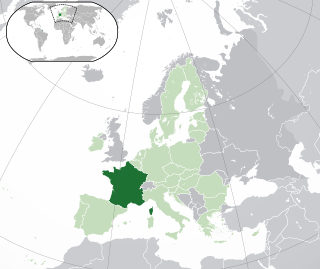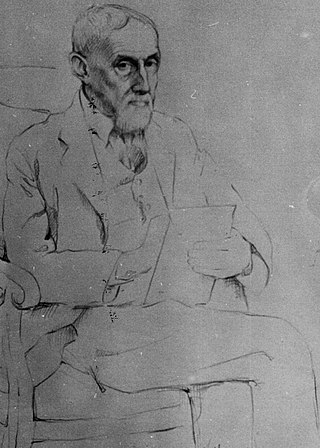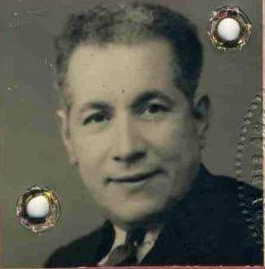Within the Muslim world, sentiment towards LGBTQ people varies and has varied between societies and individual Muslims, but is contemporarily negative. While colloquial and in many cases de facto official acceptance of at least some homosexual behavior was commonplace in pre-modern periods, later developments, starting from the 19th-century, have created a generally hostile environment for LGBTQ people. Most Muslim-majority countries have opposed moves to advance LGBTQ rights and recognition at the United Nations (UN), including within the UN General Assembly and the UN Human Rights Council.

Islam is a minority religion in France that is followed by around 3 million to 5.7 million people in France, which is around 4% to 10% of the nation's population.

The Grand Mosque of Paris, also known as the Great Mosque of Paris or simply the Paris Mosque, is located in the 5th arrondissement and is one of the largest mosques in France. There are prayer rooms, an outdoor garden, a small library, a gift shop, along with a cafe and restaurant. In all, the mosque plays an important role in promoting the visibility of Islam and Muslims in France. It is the oldest mosque in Metropolitan France.

Lesbian, gay, bisexual, and transgender (LGBT) rights in France are some of the most progressive by world standards. Although same-sex sexual activity was a capital crime that often resulted in the death penalty during the Ancien Régime, all sodomy laws were repealed in 1791 during the French Revolution. However, a lesser-known indecent exposure law that often targeted LGBT people was introduced in 1960, before being repealed in 1980.

Djamaa el Kebir, also known as the Great Mosque of Algiers, is a historic mosque in Algiers, Algeria. It is located within the Casbah, near the city's harbor. Dating to 1097, it is one of the few remaining examples of Almoravid architecture, although it has undergone other additions and reconstructions since its foundation. It is the oldest mosque in Algiers and is said to be one of the oldest mosques in Algeria after Sidi Okba Mosque and Sidi Ghanem Mosque.
Daayiee Abdullah is an American Imam based in Washington, D.C. Abdullah is said to be one of five openly gay Imams in the world. Abdullah was a member of and spiritual advisor of the Al-Fatiha Foundation until it closed in 2011. As a Muslim leader, Abdullah's homosexuality has caused controversy due to the traditionally upheld beliefs about male homosexuality in Islam.

Abdelkader Ben Ghabrit, commonly known as Si Kaddour Benghabrit was an Algerian religious leader, translator and interpreter who worked for the French Ministry of Foreign Affairs. He was the first rector of the Great Mosque of Paris.

Paris, the capital of France, has an active LGBTQ community. In the 1990s, 46% of the country's gay men lived in the city. As of 2004, Paris had 140 LGBT bars, clubs, hotels, restaurants, shops, and other commercial businesses. Florence Tamagne, author of "Paris: 'Resting on its Laurels'?", wrote that there is a "Gaité parisienne"; she added that Paris "competes with Berlin for the title of LGBT capital of Europe, and ranks only second behind New York for the title of LGBT capital of the world." It has France's only gayborhoods that are officially organized.
Ibn Sina Mosque, or la mosque Avicenne, is located in Montpellier, France, in the neighborhood of Petit Bard. Situated in the South of France, the Ibn Sina mosque is managed and run by a group of Algerian nationals from the association for the knowledge of Arab culture.
Trans Homos DZ is an Algerian organization that advocates for the rights of LGBTQI+ communities in Algeria. Since its creation, the NGO has been working to document violations based on sexual differences and to implement strategies to protect the community. Additionally, it provides victims with support, whether related to their health concerns, legal procedures, or social integration. The organization leads numerous campaigns denouncing violations against Algerian women and LGBTQ+ communities.
Mounir Baatour is a Tunisian lawyer and LGBT activist. He is the founder of the LGBT organisation Association Shams, leader of the Tunisian Liberal Party, and was the first openly gay presidential candidate in the Arab world.
Jewish-Muslim Friendship of France is an organization for interfaith dialogue between Jews and Muslims. Founded in 2004 by French Rabbi Michel Serfaty, it is known for its Jewish-Muslim Friendship Bus which travels across France to create meetings and connections with local partners, neighborhood associations, public authorities as well as local Jewish and Muslim communities. Its slogan is: "We look more alike than it seems."

Beit Haverim is a French organization for LGBT Jews.
Nur Warsame is a gay imam from Australia. He is a hafiz, i.e. one who has memorised the Quran; he is the second Victorian imam to earn this title.
Brahim Boushaki was an Algerian Scholar, Imam and Sufi Sheikh. He was born in the village of Soumâa near the town of Thénia 53 km east of Algiers. He was raised in a very spiritual environment within Zawiyet Sidi Boushaki with high Islamic values and ethics. He had great interpersonal skills and devoted his entire life in service of Islam and Algeria according to the Algerian Islamic reference.

Georges Marçais was a French orientalist, historian, and scholar of Islamic art and architecture who specialized in the architecture of North Africa.

Chems-eddine Mohamed Hafiz, born 28 June 1954 in Algiers, is a Franco-Algerian lawyer, rector of the Grand Mosque of Paris since 11 January 2020.

Abdelkader Mesli was an Algerian Sunni imam and resistance member during the Second World War. Through his actions at the Grand Mosque of Paris, at the Fort du Hâ, and within the Army Resistance Organization (ORA), he contributed to the rescue of several hundred Jews from the Holocaust. He also extended assistance to escaped African soldiers. Having survived Dachau, he returned to France after the war but passed away in relative obscurity.

Kahina Bahloul is a French imam and Islamic academic. An adherent of Sunni Islam and Sufism, she became the first female imam in France in 2019, when she founded the unisex Fatima Mosque. She advocates liberalization and modernist reforms in Islam, including equal rights for women in Islam, the creation of a distinct French Muslim identity, and an individualist approach to religion and spirituality. Bahloul does not wear a veil, which she sees as a symbol of Islamism. She opposes traditional and conservative interpretations of the Quran and their dominance in the Muslim world.
Muhsin Hendricks is a South African imam and Islamic scholar. He has been involved in various LGBT Muslim advocacy groups and has been an advocate for greater acceptance of LGBT people within Islam. He has been described as the world's first openly gay imam, having come out in 1996.











